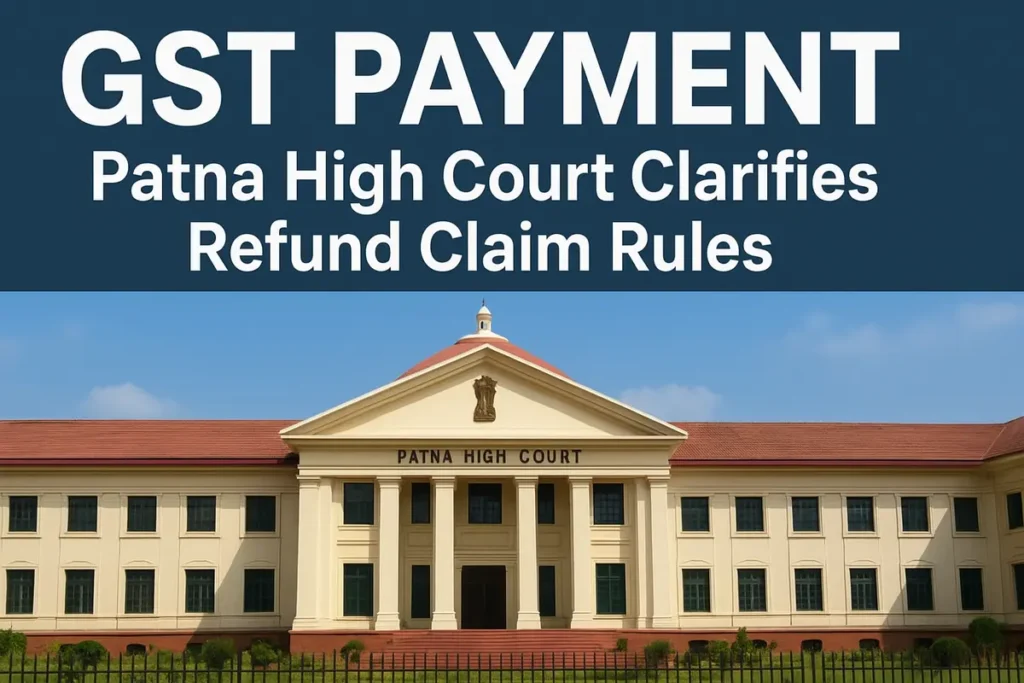
The Patna High Court has recently delivered a landmark judgment that impacts how businesses and individuals handle GST payment refunds. The court clarified that the refund time limit under the Goods and Services Tax (GST) should be calculated from the date of correct GST payment, not from the date of an earlier mistake or misclassification.
This ruling is expected to bring significant relief to taxpayers who often struggle with refund claims due to technical errors in GST return filing.
What is GST Payment and Why Refunds Are Important?
The Goods and Services Tax (GST) is a unified indirect tax that subsumed multiple state and central taxes. Every registered taxpayer is required to make timely GST payments—whether it is Central GST (CGST), State GST (SGST), or Integrated GST (IGST).
Sometimes, errors in tax classification or calculation may lead to excess tax being paid under the wrong head. For example, a business may pay SGST and CGST on a transaction that should have been taxed under IGST. In such situations, taxpayers are entitled to file a GST refund claim.
Refunds are important because they prevent businesses from losing working capital unnecessarily and ensure fair compliance under the GST framework.
Patna High Court’s Judgment on GST Refund Claims
In the case before the Patna High Court, the taxpayer had filed all returns and made GST payments for the financial year 2017-18. However, an audit later revealed a misclassification of certain transactions that resulted in underpayment of IGST.
The taxpayer corrected the error and made the right GST payment under IGST. When they applied for a refund of wrongly paid SGST and CGST, the tax department rejected the application, citing that the refund was time-barred under the GST Act.
The bench of Justices Rajiv Ranjan Prasad and Shailendra Singh disagreed with this interpretation. They ruled that the relevant date for calculating the refund time limit should be the date of correct GST payment, not the date of the mistaken payment.
Key Takeaways from the Ruling
- Correct GST Payment is the Benchmark – Refund timelines start from the date of the right payment.
- Refund Rights Protected – Taxpayers cannot be denied a genuine GST refund claim due to classification errors.
- Department’s Interpretation Rejected – The court held that the department’s view contradicted the CGST and IGST Acts.
- Refund with Interest Allowed – The taxpayer was granted a refund of wrongly paid CGST and SGST, along with applicable interest.
Why This Judgment Matters for Businesses
This decision strengthens taxpayer rights and ensures that genuine refund claims are not rejected due to technicalities. Businesses often face challenges in GST compliance, especially when dealing with interstate trade where IGST, CGST, and SGST classifications can get complicated.
By clarifying refund timelines, the Patna High Court has reduced uncertainty and provided legal support to businesses seeking refunds for excess GST payments. This will help protect working capital, reduce litigation, and improve trust in the GST system.
Broader Context: Other High Court Rulings on GST Refunds
The Patna High Court’s ruling is not the first of its kind. Several other High Courts, including the Allahabad High Court, have delivered judgments favoring taxpayers in GST refund claims. In many cases, refunds were allowed despite minor errors in GST return filing or technical glitches on the GST portal.
These judicial interpretations ensure that the GST refund process remains fair and does not penalize taxpayers for honest mistakes. Collectively, such rulings strengthen the integrity of the GST law in India.
Lessons for Taxpayers
- File Correct GST Payments Promptly – Ensure that errors are rectified as soon as possible.
- Maintain Proper Records – Audit trails, invoices, and corrected returns help in claiming refunds smoothly.
- Know Your Rights – Courts are consistently protecting taxpayers in genuine disputes related to GST payment refunds.
Conclusion
The Patna High Court’s ruling is a landmark decision that safeguards the rights of taxpayers. By declaring that the refund period should be calculated from the date of correct GST payment, the judgment prevents taxpayers from losing money due to classification mistakes.
This decision not only benefits businesses but also reinforces confidence in the GST framework. It sends a clear message: the GST refund process must prioritize fairness and equity over rigid technicalities.
For businesses and individuals alike, this ruling is a reminder that the law stands by genuine taxpayers who comply with their GST payment obligations in good faith.

